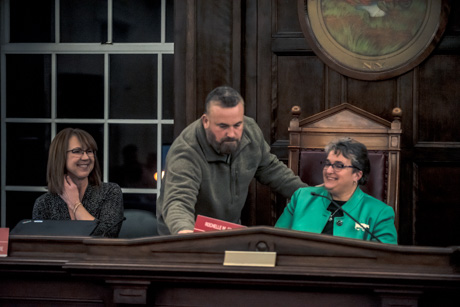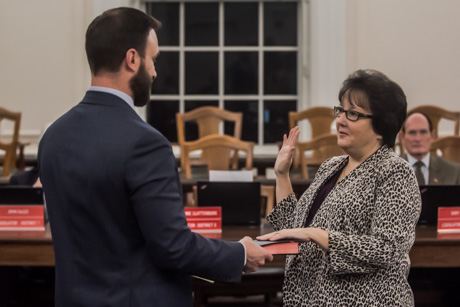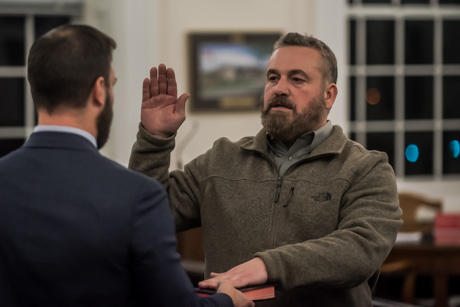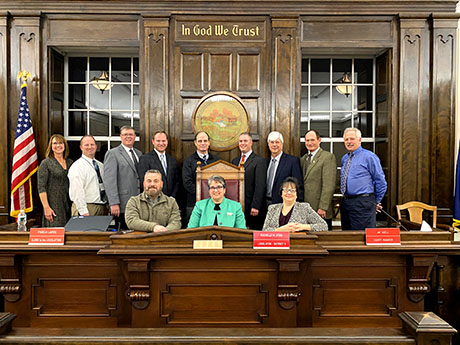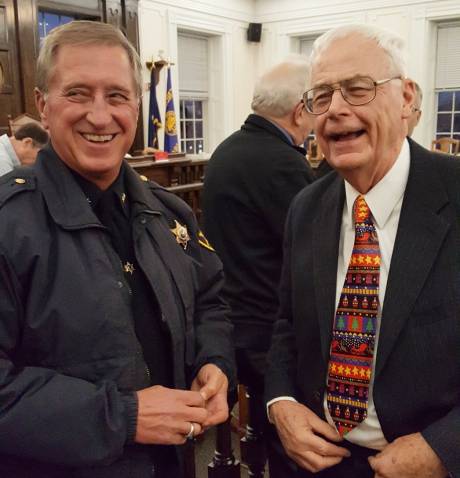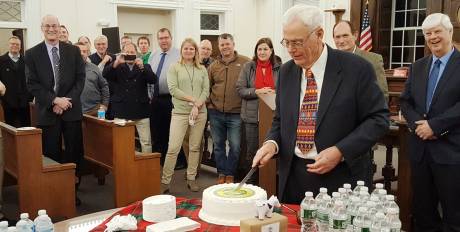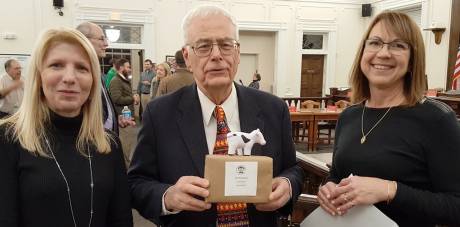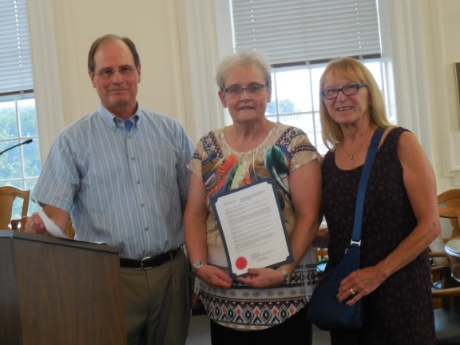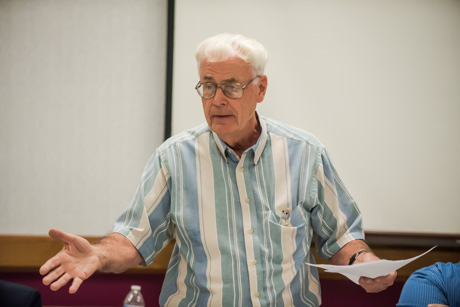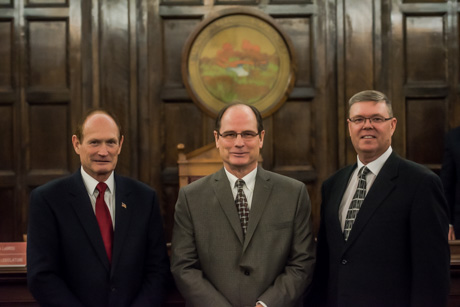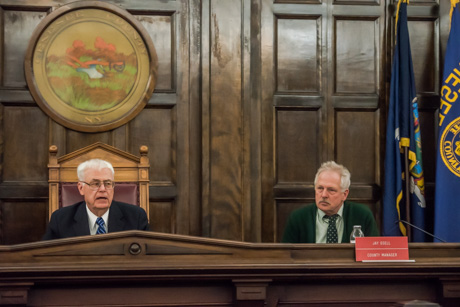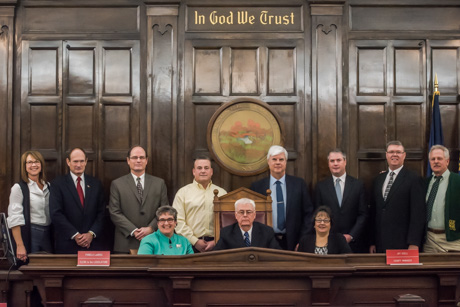The leader of the Genesee County Economic Development Center said he is attempting to persuade a company “five times the size of 1366 Technologies” to put its stake in the WNY Science, Technology and Advanced Manufacturing Park in the Town of Alabama.
“We’ve had five site visits” (with the company),” said Steve Hyde, GCEDC president and chief executive office, this afternoon at the Genesee County Legislature’s Ways & Means Committee meeting, later adding that the business is “five times the size of 1366 as far as investment and jobs go.”
“We will either be the bridesmaid or bride in this deal, and (if the latter) it would change the face of the community,” Hyde said, invoking a nondisclosure agreement. “While 1366 was a start-up, this company is very solid.”
Hyde and GCEDC Board Chairman Paul Battaglia said they were disappointed by the decision of 1366 Technologies, which manufactures solar wafers, to pull out of STAMP – a 1,250-acre, shovel-ready nanotechnologies site developed by the GCEDC.
“It took two years for the announcement that 1366 would be coming and another two years for them to pull the plug on that project,” Battaglia said after Hyde and CFO Lezlie Farrell gave the committee a quick overview of the GCEDC’s financial picture. “It takes a lot of work and effort with no guarantee that we will be successful.”
Hyde said that “fiscal pressures” in the form of decreased funding and a greater workload are “part of the challenges that are hard to overcome.” However, he said he is confident that a deal is in the near future.
“It’s just a matter of when, not if,” he said.
The GCEDC will be coordinating four projects at the STAMP site in the coming months in an effort to achieve what he called the “big house blueprint – big water, big sewer and big electric.”
GCEDC officials reported that the 2018 budget shows $26.9 million in revenue against $27.3 million in expenses, with $1.4 million budgeted for operations and $25.6 million for WNY Stamp.
Hyde said that the shortfall would be covered by annuity streams generated by HP Hood, which has moved into the former Muller Quaker yogurt plant on East Main Street Road.
He bemoaned the fact that financial backing from Genesee County has decreased by 31 percent since 2008 (currently at $193,513 annually) since the agency’s only two sources of funding are project revenues/origination fees and county support.
“The challenge is that we have is that we’ve been in an environment where the body of work has illuminated. The work activity, business development and sales, and workforce development – notably in food, beverage and agriculture – have more than doubled,” he said.
Hyde reported that in 2017, the GCEDC steered 16 projects that resulted in $240 million in pledged capital investment and 288 pledged job creation. Eight of those projects, generating $231 in capital investment, were in the food and beverage/agri-business sector.
For 2018, a key stated GCEDC goal is to secure additional investment to implement STAMP Phase II site and infrastructure development to help make the site globally competitive by better aligning infrastructure readiness timelines with market needs (market-ready/shovel-ready).
In an another development, the Ways & Means Committee engaged in a discussion with Lawley Insurance executives Reggie Dejean and Suzie Ott and County Information Technology Director Steve Zimmer about cyber liability insurance.
Cyber insurance has emerged as a result of increased activity by hackers or other criminals who gain access to a firm’s electronic network. Most notably, but not exclusively, it covers a business' liability for a data breach in which personal and/or confidential information, such as Social Security or credit card numbers, is exposed or stolen.
Zimmer said he didn’t think Genesee County has enough protection in this area.
“Cyber liability insurance would give us the financial resources to bring experts in,” he said, adding that he projected that if all data was lost at the Mental Health department, for example, it would cost up to $3.8 million to rectify the situation.
Currently, he said there are in excess of 700 users -- including volunteer fire department personnel -- on the county’s computer network, which presents the risk of someone opening an infected e-mail or attachment.
Dejean said cyber policies offered by Lawley have limits of $1 million, $2 million or $5 million, and cover data & network liability/third-party liability, web and print content liability, regulatory defense and penalties, cyber extortion (ransomware) and business interruption (loss of income). They also offer the ability to notify up to 250,000 people of a breach.
The committee made no commitment, but did get the figures -- annual premiums of: $21,663 for a $1 million policy; $27,078 for a $2 million policy; $36,061 for a $5 million policy with $100,000 deductible; and $32,818 for a $5 million policy with a $250,000 deductible.
When asked where the money would come from to pay the premium, County Manager Jay Gsell said initially it would come from the county’s self-insurance fund, “but going forward (if people are identified as causing problems) there could be some changes to financing the risk.”
Gsell, responding to a question about how to educate computer users, said he was in favor of formulating a policy, starting with the E-911 board to communicate the responsibilities associated with information technology.
“The education piece has to start sometime soon,” said Ways & Means Chair Marianne Clattenburg.
-- The committee also endorsed a resolution proposing a local law designating the opioid epidemic and its impact on Genesee County a "public nuisance" and to set a course to recover costs incurred by the county in providing related services.
The resolution, in part, states that "as a result of the opioid epidemic, costs related to healthcare, family and social services, criminal justice, addiction and rehabilitation, and many other areas have significantly increased. Many of these costs are paid by the County. The purpose and intent of this Local Law is to allow the County to recover these costs ... whenever practicable, from the responsible party."
A public hearing on the matter is scheduled for 5:30 p.m. March 28 at the Old County Courthouse.
